Today I launch a series of interviews with authors whose stories appear in The Gallery of Curiosities magazine, issue #3. With me today is Donald J. Bingle.
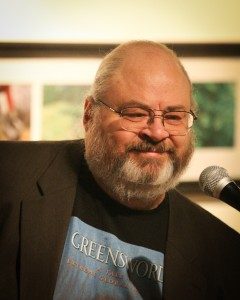
Donald J. Bingle is the author of Frame Shop, a mystery thriller set in a suburban writers’ group, Net Impact and Wet Work, spy thrillers which incorporate real-world conspiracy theories, GREENSWORD, a dark comedy about global warming, and Forced Conversion, a military science fiction novel set in the near future. Co-author of The Love-Haight Case Files, a paranormal legal thriller about lawyers protecting the rights of supernatural creatures in a magic-filled San Francisco. Edited the ghost anthology, Familiar Spirits. Also author of a variety of short fiction in the science fiction, fantasy, thriller, horror, mystery, steampunk, romance, and comedy genres, including stories in the Dragonlance and Transformers universes and in a variety of DAW themed anthologies.
Now, here’s the interview:
Poseidon’s Scribe: How did you get started writing? What prompted you?
Donald J. Bingle: I was a tournament roleplaying gamer (the world’s top-ranked classic tournament player from 1985 to 2000) and started writing tournament scenarios for others, then adventures and source materials for RPG publishers. Many of those editors also edited short fiction, so from there I branched out into short stories, including tie-in fiction for Dragonlance, BattleTech, and Transformers. Screenplays and novels were the next steps.
P.S.: Your website’s bio states you’ve written science fiction, fantasy, thriller, horror, mystery, steampunk, romance, comedy, and memoirs. Out of all those, which is your favorite genre?
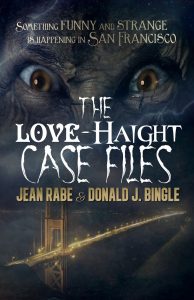 D.
D.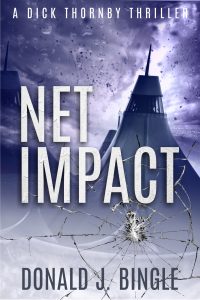 J.B
J.B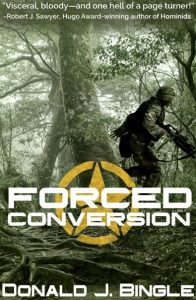 .: On the novel side, almost everything I’ve written is a thriller of one stripe or another. Forced Conversion (near future military scifi thriller); Net Impact and Wet Work (spy thrillers); GREENSWORD (darkly comedic eco-thriller); Frame Shop (murder mystery thriller); The Love-Haight Case Files (urban fantasy legal thriller); ghostwritten novel I can’t talk about (political-medical thriller). So I guess that says something. On the short side, I tend more toward scifi and horror than fantasy these days—maybe because much of my stuff is rather dark.
.: On the novel side, almost everything I’ve written is a thriller of one stripe or another. Forced Conversion (near future military scifi thriller); Net Impact and Wet Work (spy thrillers); GREENSWORD (darkly comedic eco-thriller); Frame Shop (murder mystery thriller); The Love-Haight Case Files (urban fantasy legal thriller); ghostwritten novel I can’t talk about (political-medical thriller). So I guess that says something. On the short side, I tend more toward scifi and horror than fantasy these days—maybe because much of my stuff is rather dark.
P.S.: Who are some of your influences? What are a few of your favorite books?
D.J.B.: Replay by Ken Grimwood (my favorite time travel book); Dream Park by Niven, Barnes, and Pournelle (scifi, mystery, gaming; fantasy, and history all in one package); Calculating God by Robert J. Sawyer (thoughtful scifi); The Dragonlance Chronicles by Weis and Hickman (epic fantasy done right).
P.S.: Your website identifies you as a “Writer on Demand.” Please explain what you mean by that.
D.J.B.: Because some editors from my days writing game products and stories knew that I could write fairly quickly to specifications (topic, tone, wordcount), I kind of ended up being the fallback guy for Techno Books, which packaged a lot of the themed anthologies for DAW. I wasn’t famous enough to get invited to most of those anthologies, but when the editor would come up short because someone missed a deadline or everyone wrote to the short end of the assigned range, I would get calls/emails asking me to write a story in a few days to help fill the anthology. The genre depended entirely on what the anthology was about, so I ended up doing fantasy, scifi, horror, steampunk, even comedic romance. And, of course, I ended up writing all sorts of stories I never would have written without that impetus.
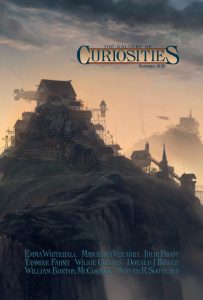
P.S.: Your story “Gentlemanly Horrors of Mine Alone” appears in The Gallery of Curiosities issue #3. Please tell us about the story and what inspired you to write the tale.
D.J.B.: I came to write the tale because Mike Stackpole had a chain story project on his website. Each story was a fellow at an Old English Style Men’s Club regaling fellow members with his latest adventure. Having lived in the foothills of Colorado for a while and being familiar with various monsters from games like Chill, putting together a tale about a monster in Colorado was a natural fit. Of course, in order for my story to be different from all the others, I gave it a twist by making the adventure a disaster rather than a triumph and the protagonist less than a hero in his own eyes.
P.S.: What are the easiest, and the most difficult, aspects of writing for you?
D.J.B.: Selling what I write is the hardest part, which includes finding a publisher for books and stories, and getting people to read what I have published. When I was writing stories on short notice for DAW, I didn’t worry much about rejection (if the story was good, it would get published) and the anthology would be distributed to every Barnes & Noble, Borders, and Waldenbooks in the country. But, now, having had books sit at publishers for periods well in excess of a year before getting any response and having to find anthologies with the right topic, tone, and wordcount requirements for my various spec stories is tedious. I spend far more time trying to place a story, than it takes to write it in the first place.
The easiest part is coming up with ideas—I have plenty of book and story ideas I will never get around to penning. Of course, most writers do, which is why people who suggest “letting” the writer write up their nifty idea and split the proceeds 50/50 are such an aggravation.
P.S.: Many of your stories seem to be reactions against tales of extraordinary heroes. Your protagonists tend to be ordinary, average people. Is that intentional? Why do you prefer such characters?
D.J.B.: There’s nothing particularly interesting to me about superpowered, extraordinary people doing great things, but for a regular guy to do what needs to be done despite the fact he may not have the skill or ability to accomplish his goal (and is therefore risking all) is heroic, or at least brave. I hesitate at the word “heroic” because some of my protagonists are simply not good guys, which I think is a nice change of pace and more realistic.
P.S.: As the author of five books and more than fifty shorter tales, are there two or three that you’d recommend to new readers who want to get to know your style?
D.J.B.: I think my spy novel series, Net Impact and Wet Work, gives a good overview of my writing. There’s action, marital strife, bizarre conspiracies, and odd bits of information all rolled into one tale. If readers want an overview of my short stories, I’ve taken many of them and re-released them in Kindle collections of 3 to 5 stories, grouped by genre. So I’ve got Tales of Gamers and Gaming; Tales of Humorous Horror; Tales Out of Time; Grim, Fair e-Tales; Tales of an Altered Past Powered by Romance, Horror, and Steam; Not-So-Heroic Fantasy; and Shadow Realities. See my website for more detail.
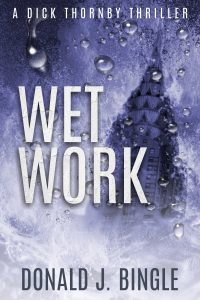 P.S.: In your latest novel, Wet Work, you return to a character featured in an earlier novel, the spy Dick Thornby. Please paint a word picture of this character for us.
P.S.: In your latest novel, Wet Work, you return to a character featured in an earlier novel, the spy Dick Thornby. Please paint a word picture of this character for us.
D.J.B.: Dick is a middle-aged, stocky, ex-Army, ex-cop with a wife and a kid and a mortgage. Everyone thinks he works as a waste-water treatment consultant, but he’s actually a spy. He does what needs to be done, but he doesn’t necessarily enjoy many aspects of his job. He’s practical, rather than idealistic, but understands it is people like him who stand between happiness and despair for an unknowing populace.
P.S.: What is your current work in progress? Would you mind telling us a little about it?
D.J.B.: Another ghostwriting project is probably my next novel, so can’t really talk about that. On the story side, I’ve got a notion about a quantum entanglement tale that is gestating.
P.S.: I have to ask. What’s this about being the Keeper of the World’s Largest Kazoo?
D.J.B.: In high school a friend and I started a kazoo band, The Greater Naperville Area All Kazoo Klan Band, as a lark and it grew to about thirty strong. We performed at freshman orientation, marched in local parades, and elected a Kazoo Queen. When I went to orientation at college (The University of Chicago), there was a sign up at the Student Activities Office seeking (mostly jokingly, I think) a Keeper for the World’s Largest Kazoo. You see, when the U of C was still in the Big Ten (Michigan State came in when we left), it had Big Bertha, the World’s Largest Drum, now owned by the University of Texas. When football returned to the U of C, a group of students drove to Texas and stole Big Bertha, driving out onto the field at an early game (not at half-time, just when they happened to arrive being pursued by the Chicago cops). This group, part of the Students for Violent Non-Action (yes, I got that right) decided that if Chicago was going to have football, they needed to have the World’s Largest something, so they built the world’s largest kazoo. They also had fezes made up for those parading it about at games. All that was a few years before me, so they were all gone and the Student Activities Office was pretty surprised when I applied to be the new Keeper and listed GNAMMAKB as relevant work experience. The Fez Faction appeared at sparsely attended football games, carried Big Ed about, and played Ode to Joy whenever the team got a first down (which was not often; my sophomore year the team scored 14 points—seven in the first game and seven in the last), but we did get news coverage from The Chicago Tribune and Sports Illustrated.
Poseidon’s Scribe: What advice can you offer aspiring writers?
Donald J. Bingle: Join a writers’ group. Your best friend, spouse, or mother is not going to give you honest, useful criticism. They likely don’t have the writerly experience or knowledge to be helpful in any case. Also, start your writing with short stories—you can learn a lot and try out a lot of different techniques, perspectives, and styles. Submit what you write to anthologies and magazines—it will give you exposure to the real world of writing, editing, rejection, and lousy pay. Don’t write for free (except for charity); that way lies madness.
Thank you, Donald. My readers can check out Donald J. Bingle’s writing at his website, on Facebook, Twitter, Goodreads, and Amazon.
Poseidon’s Scribe
